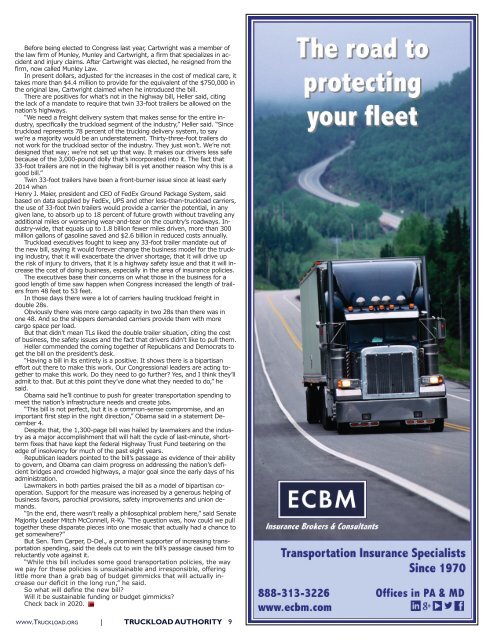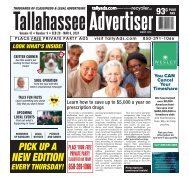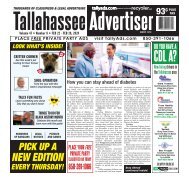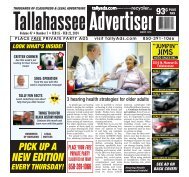Truckload Authority - Winter 2015-16
Count down our list of the top 10 trucking stories of 2015 and get all the details on the $305 billion Fixing America's Surface Transportation Act. Plus, we get the "dirty" truth from international TV star Mike Rowe.
Count down our list of the top 10 trucking stories of 2015 and get all the details on the $305 billion Fixing America's Surface Transportation Act. Plus, we get the "dirty" truth from international TV star Mike Rowe.
Create successful ePaper yourself
Turn your PDF publications into a flip-book with our unique Google optimized e-Paper software.
Before being elected to Congress last year, Cartwright was a member of<br />
the law firm of Munley, Munley and Cartwright, a firm that specializes in accident<br />
and injury claims. After Cartwright was elected, he resigned from the<br />
firm, now called Munley Law.<br />
In present dollars, adjusted for the increases in the cost of medical care, it<br />
takes more than $4.4 million to provide for the equivalent of the $750,000 in<br />
the original law, Cartwright claimed when he introduced the bill.<br />
There are positives for what’s not in the highway bill, Heller said, citing<br />
the lack of a mandate to require that twin 33-foot trailers be allowed on the<br />
nation’s highways.<br />
“We need a freight delivery system that makes sense for the entire industry,<br />
specifically the truckload segment of the industry,” Heller said. “Since<br />
truckload represents 78 percent of the trucking delivery system, to say<br />
we’re a majority would be an understatement. Thirty-three-foot trailers do<br />
not work for the truckload sector of the industry. They just won’t. We’re not<br />
designed that way; we’re not set up that way. It makes our drivers less safe<br />
because of the 3,000-pound dolly that’s incorporated into it. The fact that<br />
33-foot trailers are not in the highway bill is yet another reason why this is a<br />
good bill.”<br />
Twin 33-foot trailers have been a front-burner issue since at least early<br />
2014 when<br />
Henry J. Maier, president and CEO of FedEx Ground Package System, said<br />
based on data supplied by FedEx, UPS and other less-than-truckload carriers,<br />
the use of 33-foot twin trailers would provide a carrier the potential, in any<br />
given lane, to absorb up to 18 percent of future growth without traveling any<br />
additional miles or worsening wear-and-tear on the country’s roadways. Industry-wide,<br />
that equals up to 1.8 billion fewer miles driven, more than 300<br />
million gallons of gasoline saved and $2.6 billion in reduced costs annually.<br />
<strong>Truckload</strong> executives fought to keep any 33-foot trailer mandate out of<br />
the new bill, saying it would forever change the business model for the trucking<br />
industry, that it will exacerbate the driver shortage, that it will drive up<br />
the risk of injury to drivers, that it is a highway safety issue and that it will increase<br />
the cost of doing business, especially in the area of insurance policies.<br />
The executives base their concerns on what those in the business for a<br />
good length of time saw happen when Congress increased the length of trailers<br />
from 48 feet to 53 feet.<br />
In those days there were a lot of carriers hauling truckload freight in<br />
double 28s.<br />
Obviously there was more cargo capacity in two 28s than there was in<br />
one 48. And so the shippers demanded carriers provide them with more<br />
cargo space per load.<br />
But that didn’t mean TLs liked the double trailer situation, citing the cost<br />
of business, the safety issues and the fact that drivers didn’t like to pull them.<br />
Heller commended the coming together of Republicans and Democrats to<br />
get the bill on the president’s desk.<br />
“Having a bill in its entirety is a positive. It shows there is a bipartisan<br />
effort out there to make this work. Our Congressional leaders are acting together<br />
to make this work. Do they need to go further? Yes, and I think they’ll<br />
admit to that. But at this point they’ve done what they needed to do,” he<br />
said.<br />
Obama said he’ll continue to push for greater transportation spending to<br />
meet the nation’s infrastructure needs and create jobs.<br />
“This bill is not perfect, but it is a common-sense compromise, and an<br />
important first step in the right direction,” Obama said in a statement December<br />
4.<br />
Despite that, the 1,300-page bill was hailed by lawmakers and the industry<br />
as a major accomplishment that will halt the cycle of last-minute, shortterm<br />
fixes that have kept the federal Highway Trust Fund teetering on the<br />
edge of insolvency for much of the past eight years.<br />
Republican leaders pointed to the bill’s passage as evidence of their ability<br />
to govern, and Obama can claim progress on addressing the nation’s deficient<br />
bridges and crowded highways, a major goal since the early days of his<br />
administration.<br />
Lawmakers in both parties praised the bill as a model of bipartisan cooperation.<br />
Support for the measure was increased by a generous helping of<br />
business favors, parochial provisions, safety improvements and union demands.<br />
“In the end, there wasn’t really a philosophical problem here,” said Senate<br />
Majority Leader Mitch McConnell, R-Ky. “The question was, how could we pull<br />
together these disparate pieces into one mosaic that actually had a chance to<br />
get somewhere?”<br />
But Sen. Tom Carper, D-Del., a prominent supporter of increasing transportation<br />
spending, said the deals cut to win the bill’s passage caused him to<br />
reluctantly vote against it.<br />
“While this bill includes some good transportation policies, the way<br />
we pay for these policies is unsustainable and irresponsible, offering<br />
little more than a grab bag of budget gimmicks that will actually increase<br />
our deficit in the long run,” he said.<br />
So what will define the new bill?<br />
Will it be sustainable funding or budget gimmicks?<br />
Check back in 2020.<br />
www.<strong>Truckload</strong>.org | <strong>Truckload</strong> <strong>Authority</strong>

















